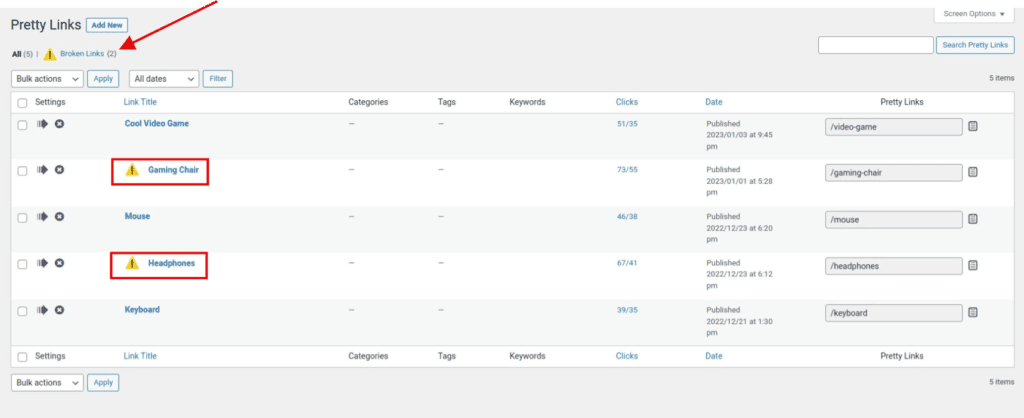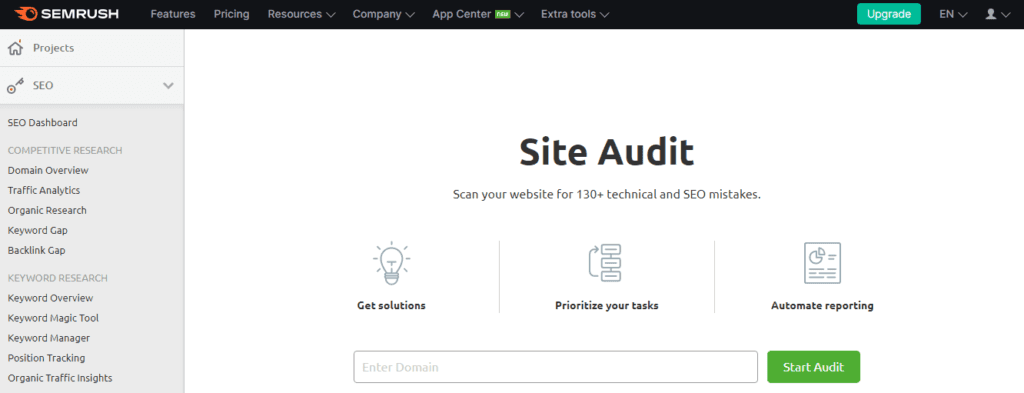Contents
Affiliate link checker tools are your first line of defense against broken links and missed commissions. Explore five top options to stay optimized and earning at all times.
Broken URLs reflect badly on your website. It can be a frustrating experience for visitors who are stopped in their tracks by a 404 error, and it could also harm your site’s search engine optimization (SEO). Broken links may even result in lost revenue if affiliate URLs on your blog don’t lead anywhere.
Discovering and removing bad links is a simple way to ensure that your website is consistent and reliable. Fortunately, there are a number of web-based tools and plugins to help you easily weed out broken URLs. This means you don’t have to search for them manually.
In this post, we’ll discuss the causes of broken links and the impact they have on your website. Then we’ll show you 5 affiliate link checker tools you can use to get rid of them.
What Causes Broken Links (and Why Do You Need an Affiliate Link Checker)
A broken link is a dead URL that no longer directs to the right place (or anywhere at all). Your website probably contains a lot of links to both your own content and to other websites.
Over time, it’s normal for pages to be moved, renamed, or deleted. Visitors who click on old links to those pages may encounter 404 Page Not Found errors:

It is important to regularly check the health of your links, as broken ones can result in a poor user experience. Outdated URLs may stop visitors from returning to your website and damage your credibility.
They can also hurt your search rankings, resulting in less organic traffic. Moreover, you may lose money if affiliate links point to the wrong place.
If you do need to make changes to your site, you can safeguard against broken links proactively by redirecting your pages correctly. You can also regularly perform content audits on your WordPress site, to ensure that you are continuously generating traffic and expanding your reach.
How to Health-Check Your URLs (5 Affiliate Link Checker Tools Your URLs Need)
Unfortunately, even if you take the precautions mentioned above, broken links are bound to happen once in a while. With that in mind, here are five affiliate link checker tools that can help you find and fix broken links.
1. PrettyLinks
There’s a reason PrettyLinks is known for all-in-one link management. It’s because our plugin truly does it all when it comes to managing your links – the good ones and the bad ones.
The Link Health feature in PrettyLinks runs weekly scans on your WordPress site to look for and report any broken links. If it does happen to find a broken link, you’ll receive an email notification where you can then go in and fix the link instantly.

Link Health also pinpoints your high-performing links first, that way you can get them fixed before your readers click through to a dreadful 404 page.
While this article does promise 5 affiliate link checker tools, why purchase and install another plugin when PrettyLinks can do it all? In addition to broken link repair, PrettyLinks also offers:
- Link Shortening. Shrink links so they’re easier to share, without losing brand awareness. That’s right! You can still keep your brand name in the shortened URL.
- Link Tracking. Keep track of every click to get a better understanding of how your audience engages with your content and where you’re getting more conversions.
- Link Redirection. Create a variety of link redirects to fit your needs, including permanent (301) and temporary (307).
- Automatic URL & Keyword Replacement. Add affiliate links to your keywords automatically to increase your click-through commissions.
See what all PrettyLinks can do for you, without ever having to leave your WordPress site!
2. AMZ Watcher
If you’re an Amazon affiliate, broken product links can mean lost commissions. AMZ Watcher helps you catch and fix them before they affect your earnings.

What AMZ Watcher Does:
- Finds broken Amazon links – Scans your site for unavailable or out-of-stock products.
- Sends instant alerts – Notifies you when a product is missing so you can update the link fast.
- Protects your commissions – Helps you replace bad links before they cost you money.
- Checks links in bulk – Saves time by scanning all Amazon links at once.
- Ensures Amazon compliance – Helps you follow Amazon’s affiliate rules to avoid penalties.
Why Use AMZ Watcher with PrettyLinks?
PrettyLinks makes your Amazon links short, trackable, and branded, while AMZ Watcher ensures they stay active. Together, they help you:
- Keep links working – AMZ Watcher finds broken links; PrettyLinks makes updating them easy.
- Maximize earnings – No lost clicks or commissions due to dead product pages.
- Manage Amazon links better – Use PrettyLinks for tracking and branding, while AMZ Watcher monitors link health.
AMZ Watcher is a great tool for Amazon affiliates, but it doesn’t replace PrettyLinks. Instead, it works alongside it to create a stronger, more reliable affiliate link strategy. It has a free plan, but you can also purchase a plan, starting at $16.63/month.
3. SEMrush
SEMrush is a popular online marketing platform that offers a comprehensive toolset primarily used for keyword research and online ranking. When it comes to checking for broken links, the Site Audit Tool can help you out a little bit.

Key features of the SEMrush Site Audit Tool include:
- Thematic reports: An Internal Linking Report finds any issues and carefully organizes link structure.
- Progress tracking: Tracks your site’s health and catches any upcoming issues.
- Site migration workflow: Offers crawling by URL lists, and exporting of URLs for easy redirect mapping.
- Error Categorization: Identifies 404 errors, broken internal/external links, and redirect loops, making it easier to prioritize fixes.
- Competitor Link Analysis: Tracks competitors’ link structures, helping you identify broken links on their sites that could be opportunities for your own backlinks.
- Integration with Google Tools: Works with Google Search Console and Google Analytics, offering more insights into how broken links impact your traffic and rankings.
- Scheduled Audits: Allows you to set automatic audits so you can regularly check for broken links without manual effort.
The biggest limitation, however, is the 100 link checker limit. Anything over that, you’ll need to purchase a pricey subscription from plans starting at $139.95 per month.
4. Ahrefs

Ahrefs is another great SEO software that also happens to dabble in link building. It offers a web-based Broken Link Checker tool, which will quickly scan for dead internal and external links.
Key features of the Ahrefs Broken Link Checker too include:
- Locating dead links: Both inbound and outbound bad links are quickly located so you can fix them.
- Scheduled link scans: Runs daily, weekly, or monthly site crawls.
- Identify competitors’ broken pages: Allows you to redirect competitors’ dead pages to similar content of your own.
- Backlink Monitoring: Finds broken backlinks to your site so you can recover lost SEO value.
- Redirect Tracking: Identifies redirect issues to keep your links working properly.
You can use the Broken Link Checker for free. But to access additional Ahrefs features, pricing starts at $29, with free access to webmaster tools.
5. Screaming Frog
Next on our list, Screaming Frog is a desktop SEO software that can help you locate broken links. Once you’ve downloaded the SEO Spider Tool, all you need to do is add your website’s URL. You will then be able to filter out the 404 pages to find problem links.

Key features include:
- Finding broken links: Crawls your website to find broken links and server errors to fix.
- Audit redirects: Helps find temporary and permanent redirects, and can search for a list of URLs in a site migration.
- Scheduled audits: Crawls can be set to run at chosen intervals, and auto-exports crawl data anywhere, such as Google Sheets.
- Internal & External Link Reports: Analyzes both internal linking structure and outbound links, helping you optimize navigation and SEO.
- Custom Search & Filters: Let’s you set custom parameters to find specific broken links, missing metadata, and duplicate content.
- Integration with Google Tools: Connects with Google Search Console and Google Analytics for deeper insights into how broken links affect traffic.
The Screaming Frog SEO Spider tool can be downloaded for free. However, if you want to crawl more than 500 URLs, pricing begins at $259.
Conclusion
Using links throughout your website is an effective way to boost your SEO and traffic. However, in order to see the best results, you should ensure that your URLs actually work. Checking for broken links regularly will help you maintain your site’s performance and ensure a strong user experience, so visitors will keep coming back for more.
The good news is that you don’t have to do the work manually. We have highlighted five affiliate link checker tools you can use to address broken URLs:
- PrettyLinks: Offers a variety of features for link management, with customizable tools.
- AMZ Watcher: Monitors Amazon affiliate links for broken products, detects unavailable products, and alerts you to prevent lost commissions.
- SEMrush: Quickly scans your site for broken links and other errors.
- Ahrefs: Identifies competitors’ broken pages, so you can take advantage of content gaps.
- Screaming Frog: Provides a variety of filters, including the ability to search for a list of specific broken URLs.
Do you have any questions about health-checking your site’s URLs? Let us know in the comments section below!
If you liked this article, be sure to follow us on Facebook, Twitter, Pinterest, and LinkedIn! And don’t forget to subscribe to our newsletter!









Leave a Reply